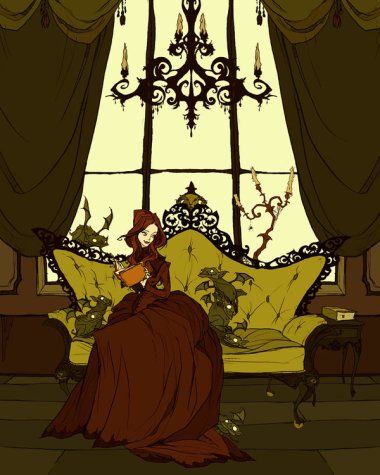 Well, I’m not entirely sure how it got to be 2016, but here we are just the same. I’ve been contemplating my first post of the year for a while. I talk about grammar and etymology a lot, but I realized that I haven’t talked about editing very much. So today, I’d like to tell you a bit about the work that I do as an editor.
Well, I’m not entirely sure how it got to be 2016, but here we are just the same. I’ve been contemplating my first post of the year for a while. I talk about grammar and etymology a lot, but I realized that I haven’t talked about editing very much. So today, I’d like to tell you a bit about the work that I do as an editor.
For starters, did you know that there are different types of editing? I’m going to talk about the ones that I do, but there are more. If you’re interested, you can find a list (along with definitions) of the different types of editorial skills on the Editors’ Association of Canada website.
Copy editing
Along with fixing issues relating to grammar, spelling, and punctuation, a copy editor also ensures that your document is consistent. In fiction, that might be pointing out that a character who died in Chapter 1 appears (not as a ghost or a flashback) in Chapter 3. In non-fiction, it could be making sure that your reference list doesn’t include any Ibids because they aren’t used when you’re following the APA style guide.
Stylistic editing
Now, a stylistic editor will go a step further by making sure your meaning is clear and your writing is smooth and shiny. That might include getting rid of jargon or rewriting sentences in plain language to make the document accessible to its target audience.
Structural or Substantive Editing
A structural editor (who is also known as a substantive editor) is a bit like an architect for your document. They might move sections around or suggest some tweaks in how you’ve structured your plot, with the goal of improving logical flow.
Developmental or Project Editing
If you have an idea and a pile of research, but you aren’t sure how to turn that into a finished document, a developmental (or project) editor will help you turn that information into something beautiful that also makes sense. Developmental editors are kind of like the fairy godmothers of editing.
Manuscript Evaluation
Finally, if you’ve written something but you’re not sure it’s ready for publication, a manuscript evaluator will read the whole thing and give you a detailed report on its strengths and weaknesses. That can include inconsistencies in the plot, missing information, issues of grammar and style, and much more.
In addition to types of editing they do, most editors also have areas of expertise or specialization. In my case, that’s editing for the academic and NGO sectors, particularly anything to do with the social and health sciences. Some of the expertise I bring to my academic editing work includes knowing the relevant style guides, like APA and AMA, and being familiar with statistics and how the peer review process works.
Of course, those of you who know me also know that I have a great big soft spot for certain genres of fiction, especially sci-fi, dystopian, fantasy, and supernatural. Working on a fiction manuscript from one of those genres is like dessert for my brain!
So when you’re looking for an editor, keep a couple of things in mind. First, make sure you find someone who is familiar with your topic or your genre. I don’t read westerns, so I wouldn’t be the best person to edit one. You wouldn’t go to a pastry chef for sushi, would you?
Second, don’t jump on the cheapest quote. Do your research and make sure you’re hiring the right editor for your project. And understand that a good editor is an expert at what they do, so you shouldn’t expect to pay minimum wage. Invest in your writing; don’t just throw your money away to the lowest bidder.
Trust me, your readers will thank you.
Image credit: Storytime with the Goblins by AbigailLarson @ deviantART
Very nice summary of the different types of editing, Suzanne. Very accessible. I also will share with you that my heart sped up a bit when I read that you’re partial to dystopian fiction. Love the genre, myself! Except zombies. I don’t do zombies. By the way, I hope you’ve been following my Friday Follies! Here’s the latest in the series (says she, shamelessly touting her own blog)! 🙂 https://crossedeyesanddottedtees.wordpress.com/2016/01/15/friday-follies-23-4-mistakes-that-make-me-go-arghhh/
Thanks Ellie! Dystopian fiction is my favourite. It’s also the kind of fiction I tend to write (when I have time, which has been scarce lately!).
And thanks for sharing the link to your latest Friday Follies! I’m all for shameless self-promotion. Plus your posts are a lot of fun to read. 🙂
Suzanne thank you for this. 🙂
You are very welcome, Ranu! Thank you for taking the time to read it. 🙂
I had an author come back to me many months after my sample edit for him because the cheaper editor he settled on didn’t work out and he liked my work better. He understands now why you can’t just go with the least expensive option. We made an arrangement that suited his budget.
Thanks, Suzanne. Thoughtful article, as usual!
(#dystopianrules)
Thanks for reading, Vanessa! It’s nice when authors figure that out, isn’t it? Even better when they already know. 🙂
This is a great post! You sum up the different types of editing very nicely. Good tips for authors looking for editors, too. It seems like a lot of indie authors tend to look for the cheapest quote, until they have a bad experience.
Thanks Kristy! (And sorry for the slow reply.) There’s nothing quite like a bad experience to change attitudes. 🙂